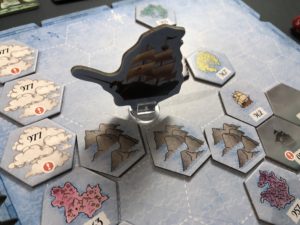
GNG GAMES OF 2020
January 22, 2021 by Sam
Doing a best games of 2020 is a little like doing the best things about the open air after a year in a cellar. Opportunities to gather around a table were minimal, and Joe and I spent most gaming time either with our families or (when the rules permitted) opposite a single opponent. Although this is very much a first-world problem when so many people have faced so many difficulties, it’s still been a bit grim. Your social circle closing in isn’t great for mental well-being, even if the physical justifies it.

Nonetheless! We did manage to play some games, and we did find more than a few of them suggesting themselves as favourites for when something approaching normality returns. Narrowly missing the top-ten cut here are the lightish war games of Freedom and Shores of Tripoli, the Mad Max inspired race/death battle of Gaslands Refuelled, the adventure-as-maths lovable oddity that is Vindication, the classic-feeling two-player abstract battle that is SHOBU, and the utterly brutal solo game Stilicho: Last of the Romans. Check ’em out!
THE TOP TEN
-
First played in 2019, but a fraction too late to make last year’s list, Babylonia arrives from the great Reiner Knizia as a fully-formed classic. Don’t be fooled by the slightly muddy board, the abstracted pieces or even that first what-does-this-do-again play. This isn’t a heavy strategic wargame or an iconographic overload: once you know what you’re doing, the game will barely take an hour. And yet there is so much variety here in the play: not from campaign scenarios or many-routes-to-victory, but the simple but variable set-up and then every decision the players make. It’s not a zero-sum game, but you certainly want to be aware, and responsive, to what your opponents are doing, whilst scheming and hoping you can pull off a big move of your own. Fast-moving, tactical, reactive, and highly interactive, this takes Knizia’s classic Tigris and Euphrates and re-engineers it to be lighter, faster, more accessible, and yet still as gripping.
-
2020 being what it was, it’s almost incongruous to have a party game in the list, yet here we are. Perhaps because Wavelength can be played competitively with 4 or more, but co-operatively with as few as 2 players, and we found it excellent in both scenarios.
There are so many thousands of games out there, with hundreds more every year, that the concept of coming up with something genuinely new, fresh and unfamiliar, seems nigh-on impossible. But Wavelength did it for us; providing not just a huge amount of laughs but also genuine discussion – an intersection between play and perception that’s incredibly easy to understand in concept, and yet surprisingly wild in what it throws up.
-
Actually harking back from 2014, this was only recently discovered by us. I should clarify Joe is less enamoured of it than I am, but this is possibly my favourite ‘big’ game of all time – a lovingly assembled adventure set in some far off galaxy where there is so much freedom in what you can do and so much variability from play to play. You can have a short game or a long one, a combative approach or a be a peaceful trader. Observe the galactic laws – or break them. The rulebook is a bit mad, and getting your head around everything demands a few hours, but for the big experience that games such as Talisman always promise but – for me – never deliver on, this is it: the Holy Grail!
-
It’s that man Knizia again with his take on a legacy game. Legacy games are something I usually avoid, feeling both like a demand on your time and – sometimes – a triumph of novelty over longevity, but My City starts you off so gently – a diametric opposite to Babylonia – with a simple polyomino tile-laying game that before you know it you’re sucked in and 24 short, but far from disposable plays later the whole thing is done and dusted and you realise he tricked you. Very more-ish; very fun.
-
Forgotten Waters relies so heavily on a story-telling app it’s almost as if the game plays you – holding your hand as you – half pirates, half doofuses, half co-operative and half competitive – are led around the seven seas searching for treasure, revenge, or possibly a one-eyed talking dog. Thankfully doesn’t take it’s own narrative too seriously, but Forgotten Waters does take the idea of player engagement seriously, turning my son from reticent gamer into avid adventurer, demanding repeat visits. Elegant, nuanced, strategic? – Not at all. Forget control, forget strategy and tactics: this is just fun.
-
In Vino Morte is evidence of what can be achieved with a few simple cards and a simple, but genius, idea. Some cards are wine; at least one is poison: you can drink (reveal your card and hope it’s wine) or swap cards with someone, without revealing either card. The catch is one person knows where the poison is, so rather than blind luck, In Vino Morte is about second-guessing, table-reading, bluff and double-bluff. A microcosm of the tensest poker game ever that plays in about two minutes.
-
All deduction games have some kind of juice, but they’re often saddled with slighty clunky elements that can put people off: Clue‘s tedious movement system, the potential for mistakes to undo a game of Cryptid, the sheer length of the otherwise fun Mystery of the Abbey: they’re excellent in moments, but come with baggage. The Search for Planet X keeps every game unique and error-free with an app; my initial recoil from games-with-apps was overcome on a first play. You’re trying to determine the location of the elusive planet, and do so by establishing what celestial bodies reside in other parts of the sky: each play of Planet X establishes from the start certain rules that help you, by uncovering the location of asteroids, comets and gas clouds, narrow down the location of the invisible planet. The genius is in how at certain points in the narrative players are cajoled into sharing information with each other by proposing theories – giving a fresh flood of information that may – or may not – be accurate.
-
Another older game, new to us in 2020. I never played Stratego as a kid, but this implementation of the basic system is a delightful two-player battle that offers the kind of bluffing and false-flag tension we love. ‘Programming’ your troops within the imposed limits of the game is easy; the goal is to get the double-agent piece to your opponent’s end of the board and all your troops facilitate that in some way. The catch is your opponent can stop you activating if they successfully guess what your next card is, lending every round the potential for lucrative military progress, or catastrophic unravelling.
-
Scape Goat flips conventional social deduction on it’s head. Instead of someone knowing they’re the traitor, saboteur or otherwise treacherous member of the gang, here no-one can be sure who it is – not even the scape goat themselves! A slightly wonky first play is worth persevering with – if, that is, you love the tingling tension and palpable paranoia Scape Goat generates!
-
Spicy is an excellent take on a bluffing game; easy to teach and super-fast-moving. You can play any card you like as long as you say it’s the right card: cards are played face-down. But if someone calls you out correctly, they get the cards as points. Spicy’s genius is that you only need to be half-right: if the suit or number matches, you can still get away with it and claim the cards for yourself. The double-catch is your opponent decides which aspect you were lying about (assuming you’re lying at all). It can get so tense fibbing about your own hand you forget to call out other people – and that tension is what Spicy is all about.

Sam likes games. He buys a lot of games, plays a lot of games, and likes talking about games too. Occasionally he dreams about games. Despite this, he is a happily married individual with reasonably well-adjusted children, who roll their eyes at him on a pretty frequent basis.
But they still play the odd game, so it's ok.
Sam's favourite games are a constantly shifting thing that he'd find hard to define, although he's not mad keen on orcs, miniatures, or heavy sets of rules with endless exceptions and special circumstances. He plays the occasional solo game, but feels a big part of board-gaming's appeal is the gathering of friends around a table, interacting with a tangible, physical thing.
